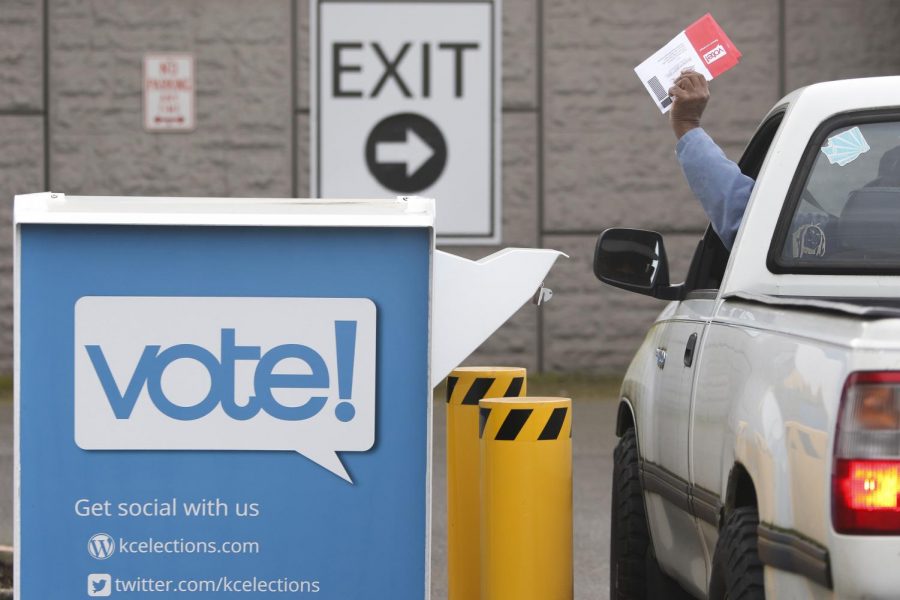Editorial | Voter accessibility should not be a partisan issue
Jason Redmond, Getty Images | TNS
Voters drop off their presidential primary mail-in ballots at a drop box at King County Elections in Renton, Washington, on March 10.
November 4, 2020
Voter turnout was higher in this general election than it has been in years, with a significant portion of Americans choosing to vote by mail. Aside from who would win the election, many people who voted by mail also found themselves asking another question — whether or not their ballot would even be counted.
Politicians — including the president — are challenging mail-in ballot deadlines. Others are trying to reject ballots solely for subjective reasons, such as if a signature doesn’t match in Pennsylvania or doubts about the validity of clearly secure drive-thru early voting in Texas. These cases made it all the way to each state’s supreme court. While it’s important to keep voter security in mind, many of these challenges are ill-fated and skewed. These efforts have been almost exclusively led by Republican politicians, suggesting that they’re trying to swing the election in favor of President Trump. But voter accessibility and a fair election are basic tenets of democracy, and shouldn’t be treated as partisan issues.
Especially in swing states like Pennsylvania, more Democrats requested mail-in ballots than Republicans. It makes sense that Republican voters would feel more comfortable voting in-person on Election Day, considering Trump spent months falsely calling mail-in voting fraudulent and a “scam.” Researchers have repeatedly found little difference in security between mail-in ballots and in-person voting, and Trump himself requested a mail-in ballot for Florida during the primary. And though it’s oppressive, it’s not surprising that Republicans are pushing to shorten deadlines and challenge early votes — these votes likely favor the Democratic nominee, former vice president Joe Biden, so Republicans would benefit from challenging said votes.
There have been mail-in ballot challenges all throughout the United States. In Texas’ Harris County — notably the state’s most populous and liberal-leaning county — GOP activists tried to throw out nearly 127,000 early drive-thru votes. They argued that drive-thru voting, under state election law, should only be available for voters with disabilities. The Texas Supreme Court ultimately struck down this challenge.
But Pennsylvania — a key swing state that, by a slim margin, went to Trump in 2016 — has faced ongoing mail-in ballot challenges from Republicans. In the June presidential primary, 1.5 million residents voted by mail, and more than 26,000 ballots were rejected — a substantial amount for “signature-related errors or matters of penmanship.” The Pennsylvania Supreme Court ruled against the practice since it is not included in the state’s elections law, likely saving — at least — thousands of votes in the general election.
About 9 million people in Pennsylvania have chosen to vote by mail, and about two-thirds were Democrats. Republicans tried to outlaw ballot drop boxes and satellite election offices that blue counties in southeastern Pennsylvania planned to use. Democrats felt this was a voter suppression tactic, targeting areas would likely go to Biden.
Trump said on Sunday that he and his campaign would be “going in with our lawyers” in an effort to end ballot counting when polls close in Pennsylvania. But under a Pennsylvania Supreme Court ruling from September, county boards of elections are legally allowed to count ballots postmarked on or by Election Day — so long they are received before Friday at 5 p.m.
This is so much more than just voter suppression or lack of accessibility. This is oppression, and it’s a clearly partisan effort to skew the election. Access to the ballot box should not be a partisan issue and is central to democracy. Fighting for democracy is an American value. This oppression is not democracy. It may not be fascism yet, but it is not far off.



